Physical Address
304 North Cardinal St.
Dorchester Center, MA 02124
Physical Address
304 North Cardinal St.
Dorchester Center, MA 02124
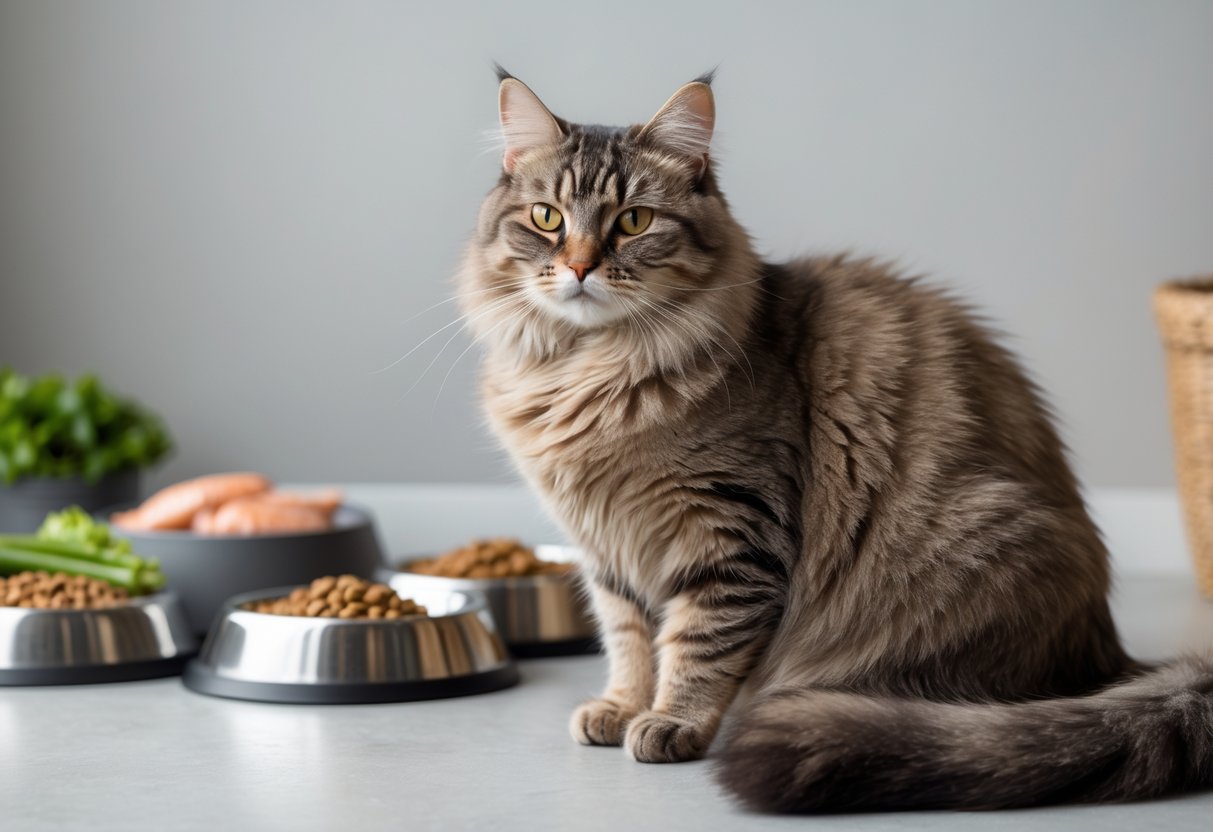
Most cat owners love sharing treats with their furry friends, especially when they’re enjoying something as sweet and juicy as watermelon on a hot day. But since cats have different dietary needs than humans, you really need to know what’s safe before slipping them a slice.
Watermelon is safe for healthy cats to eat in small amounts, but it should only be given as an occasional treat.
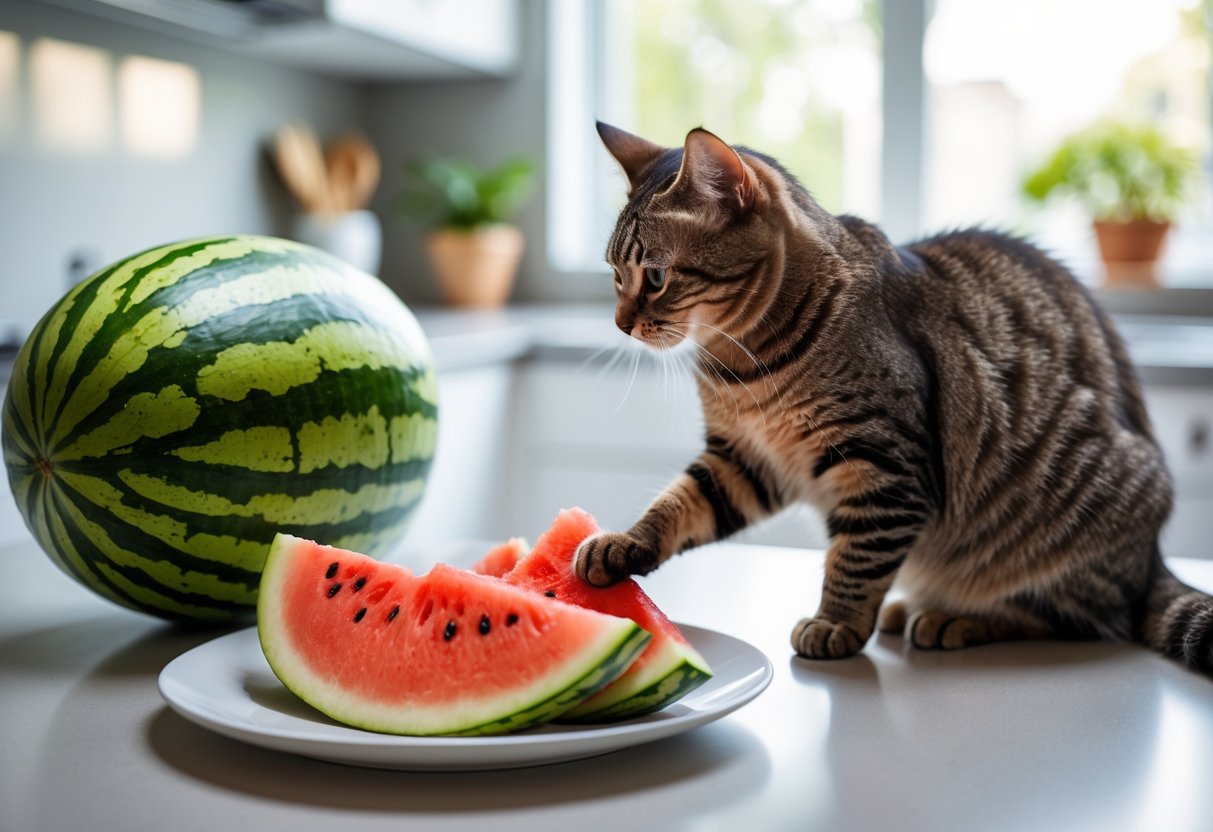
Cats don’t need fruit in their diet. They get all their essential nutrients from animal-based foods.
Letting your cat try a bit of watermelon can be fun, but too much sugar or sloppy preparation can cause problems. You want to know how to offer watermelon safely so you don’t end up with a sick kitty.
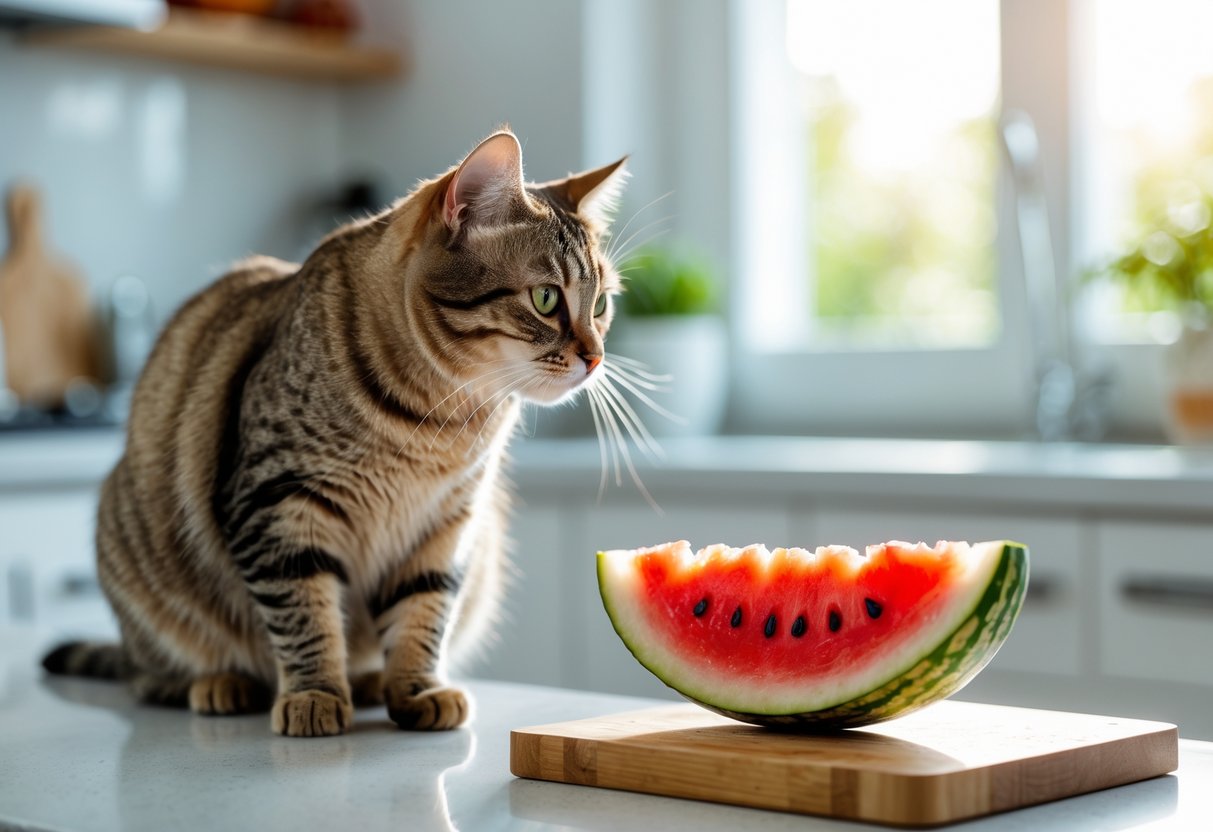
Many cats can eat a little watermelon, but they don’t actually need it in their diet. Watermelon works best as a rare treat, and you have to be careful about how you serve it.
Some cats might enjoy the taste or texture, while others just won’t care at all.
Watermelon is generally safe for cats if you prepare it right. Give only the flesh in small pieces—never the seeds or rind.
Seeds can be dangerous since they sometimes contain compounds that could be toxic and are also a choking risk. The rind is tough, doesn’t offer any nutrition, and could block up your cat’s digestive system.
Watermelon is made up of about 92% water and has small amounts of vitamins like Vitamin A, Vitamin C, and potassium. Cats are obligate carnivores, though, and don’t need fruit to stay healthy.
Too much watermelon can cause mild stomach upset or diarrhea. Always watch for allergies or tummy trouble—vomiting or funky stools are your warning signs. If your cat reacts badly, skip the watermelon next time.
Important:
Watermelon should be a rare snack, not a daily thing. A couple of small bites every now and then is plenty.
Experts usually say treats—including fruit—shouldn’t make up more than 10% of your cat’s daily calories. For a typical adult cat needing about 250 calories a day, all treats combined should stay under 25 calories.
Half a cup of watermelon? That’s already too much for most cats. Stick to a few small chunks.
If your cat is on a special diet or has health issues like diabetes, it’s best to skip watermelon unless your vet gives the green light. Too many treats can pack on the pounds and cause other problems.
Tip:
Cut watermelon into tiny cubes to make it easier for your cat to eat. Keep an eye on them after they try it, just to be safe.
Kittens have delicate stomachs and need special nutrition. Watermelon isn’t toxic for most kittens, but it’s not really a good treat until they’re older.
Young kittens should get all their nutrients from their mother’s milk or a good kitten formula, then move on to food the vet recommends.
Fruit snacks like watermelon can upset a kitten’s digestion. Because their bodies are so small, they’re more likely to have trouble with the sugar and fiber in watermelon.
There’s also a bigger choking risk—especially if any seeds or rind slip in. If your kitten is old enough for solid food and you’re still tempted to offer watermelon, only give a tiny, seedless piece.
Always check with your vet before giving fruit to a kitten. Don’t offer watermelon to kittens under 12 weeks old. For older kittens, supervise closely if you decide to share any fruit at all.
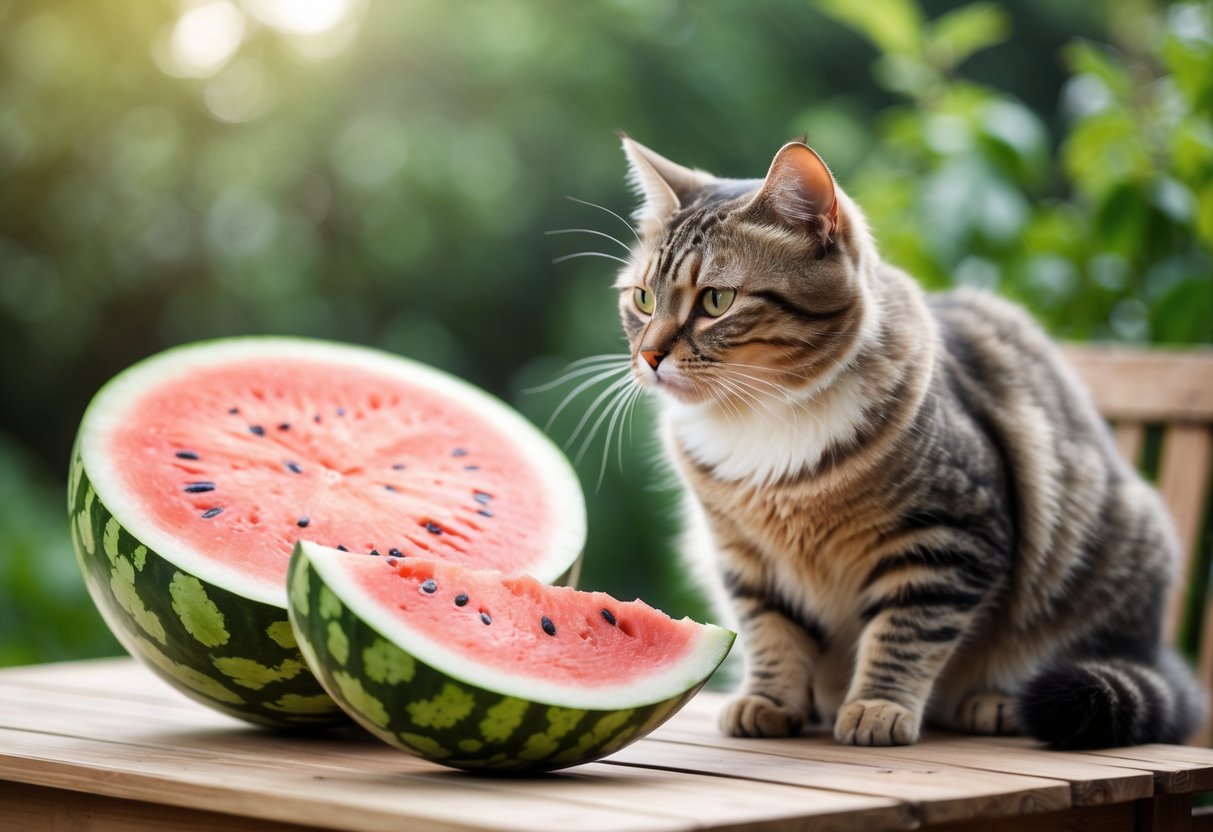
Watermelon is safe for cats in small amounts and can offer some mild benefits. It’s mostly water, low in calories, and has a few vitamins and minerals.
With about 92% water, watermelon is a hydrating snack. This can help if your cat doesn’t drink much water, especially in hot weather.
The fruit is also low in calories, so it won’t add much to your cat’s daily intake.
Nutritional facts per 100g of watermelon:
Since watermelon isn’t calorie-dense, small portions won’t cause weight gain in healthy cats. Just remember: always serve seedless, rind-free pieces to avoid digestive issues.
Watermelon has small amounts of several vitamins and minerals. Some of the nutrients in watermelon include:
While these are nice bonuses, cats get most of what they need from meat. Watermelon can’t replace their main diet.
Cats are obligate carnivores. They need animal protein to thrive, and their bodies are built to use nutrients from meat, not plants.
Watermelon has no protein and is higher in carbs, which cats don’t really need. Plus, cats can’t taste sweetness like we do, so they’re not drawn to watermelon for the flavor.
A bite of watermelon is safe, but it can’t provide the amino acids, fatty acids, or other essentials cats need for long-term health. Watermelon should always be a treat, never a main food.
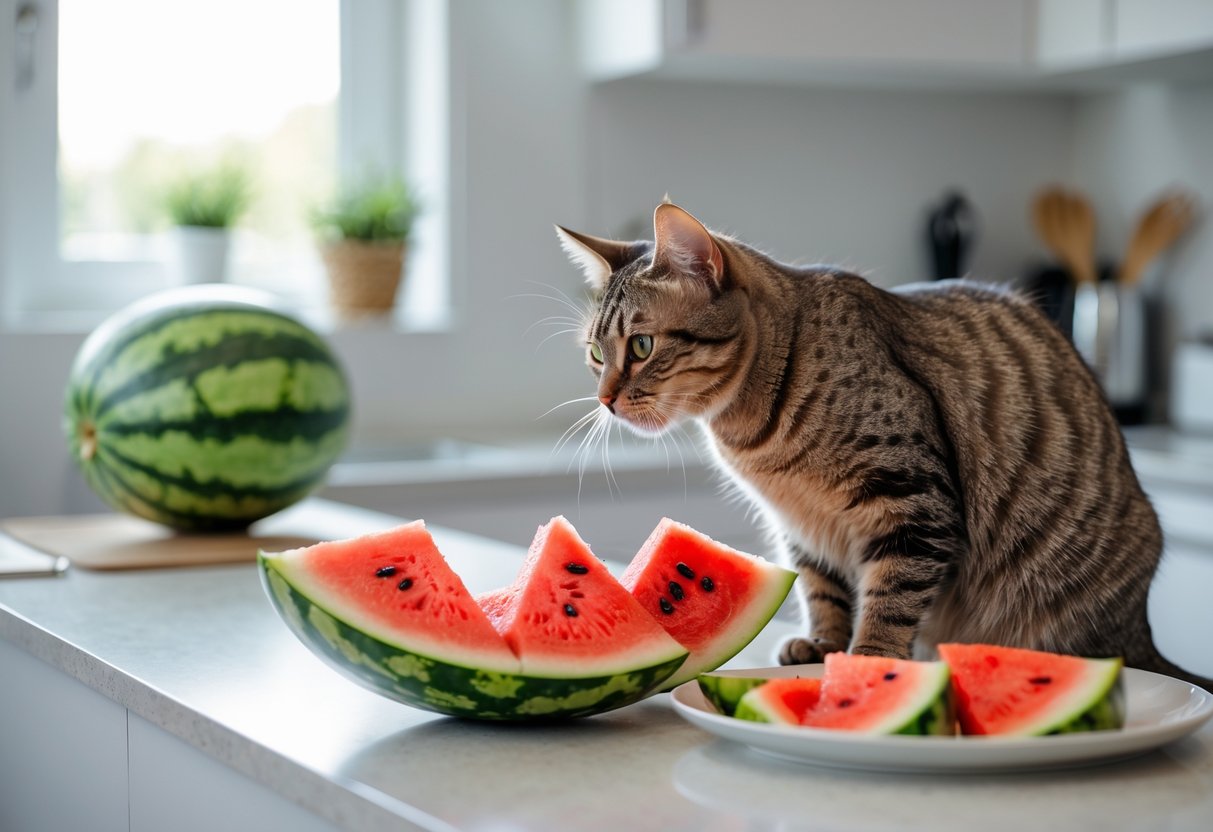
Giving watermelon to cats might seem harmless, but there are some risks to keep in mind. Some cats just don’t tolerate it well, and certain parts of the fruit can be dangerous.
Watermelon flesh isn’t toxic to cats, but the seeds and rind are a different story. Watermelon seeds can cause choking or intestinal blockages, and some even contain tiny amounts of cyanide, which is toxic.
Always remove all seeds before offering watermelon. The rind is tough and hard to digest—it can upset your cat’s stomach or cause vomiting and diarrhea.
Even too much of just the flesh can lead to loose stools or an upset digestive system. Cats’ bodies just aren’t built to handle a lot of fruit or sugar.
Table: What to Avoid When Feeding Watermelon to Cats
| Unsafe Part | Risk |
|---|---|
| Seeds | Choking, toxicity |
| Rind | Digestive upset |
| Large amounts | Diarrhea, vomiting |
Offer only a small amount of the seedless flesh as an occasional treat.
Some cats shouldn’t eat watermelon at all. Cats with diabetes are especially at risk since watermelon has natural sugar that can mess with blood sugar levels.
Obese cats or those with weight issues should stay away from high-sugar treats, including watermelon. If your cat has tummy troubles or sensitive digestion, watermelon probably isn’t a good idea either.
Kittens have more sensitive digestive systems than adults, so it’s safer to wait until they’re older. Cats on special veterinary diets—like those with kidney or digestive problems—shouldn’t eat watermelon unless the vet says it’s okay.
If you’re not sure, ask your vet before giving your cat new foods, especially if there’s an ongoing medical issue.
Cats can react differently to watermelon. After your cat tries it, keep an eye out for symptoms that could mean trouble.
List of warning signs:
If you spot any of these, stop giving watermelon right away. If things don’t improve or your cat gets worse, call your vet.
Always start with a tiny piece and watch how your cat reacts. Not every cat will enjoy watermelon, and some just can’t handle it. Better to play it safe and keep a close eye whenever you introduce something new.
Cats can eat watermelon, but you need to follow a few steps to keep things safe. Preparation and serving matter—a lot.
Pick a fresh, ripe watermelon. Avoid pre-cut watermelon, since it might have added sugars or preservatives.
Cut a slice and take out all the seeds. Watermelon seeds contain small amounts of cyanide and can be harmful if your cat swallows them.
Remove the rind, too. The tough outer layer is hard for cats to digest and could cause a blockage.
Chop the red, juicy part into small, bite-size pieces. Make sure they’re easy for your cat to chew and swallow.
Only serve plain watermelon—no salt, sugar, or extra flavors. Wash the fruit before cutting to get rid of pesticides or dirt.
Quick List: Preparing Watermelon for Cats
Cats can eat watermelon, but only in tiny amounts. Large servings? Not a good idea.
Watermelon packs a lot of sugar, which cats really don’t need. Too much might upset their stomach or give them diarrhea.
One or two small chunks, about fingernail-sized, make a fine occasional treat. Fruit isn’t something cats need every day.
Giving watermelon once every week or two is plenty. Honestly, most cats won’t beg for more.
Don’t swap out regular cat food for watermelon. Cats crave protein, not fruit, to stay healthy.
Keep watermelon as an occasional snack, not a meal staple.
Table: Suggested Serving Size
| Cat Size | Max Pieces per Treat |
|---|---|
| Small Cat | 1 small cube |
| Large Cat | 2 small cubes |
After your cat eats watermelon, keep an eye out for any problems. Some cats might throw up, get loose stools, or show signs of a tummy ache.
These signs could mean watermelon just isn’t for them. Also watch for allergies or trouble breathing, just in case.
Most cats handle a tiny bit of watermelon fine, but every cat’s different. If your cat turns up their nose at watermelon, don’t push it.
Stop offering watermelon if you spot any sickness or weird behavior. Serious symptoms? Call your vet right away.
Watermelon’s fine as a treat if you stick to small, seedless pieces. Still, there are other fruits cats can safely try in moderation.
Some fruits add a splash of variety or hydration, but you’ve got to know which ones are actually safe.
Certain fruits work as an occasional snack for cats. Always serve in small bites, and ditch any seeds, pits, or rinds.
Here are a few safe picks:
Keep fruit treats rare—less than 10% of your cat’s diet is more than enough. Introduce new foods slowly and pay attention to any stomach issues.
If your cat snubs a fruit, don’t sweat it. Not every cat is into fruit, and that’s totally normal.
| Fruit | Safe for Cats? | Important Notes |
|---|---|---|
| Watermelon | Yes | No seeds or rind |
| Blueberries | Yes | Small amounts, good antioxidants |
| Banana | Yes | High in sugar, offer rarely |
| Apple | Yes/Partial | No seeds or core |
| Cantaloupe | Yes | Remove seeds, serve plain |
| Strawberry | Yes | Offer rarely, high in natural sugar |
Some fruits just aren’t safe for cats and can even be toxic. Citrus fruits and anything with risky seeds or pits can be a real problem.
Never feed your cat these fruits:
If your cat eats something toxic, watch for drooling, vomiting, diarrhea, or extreme tiredness. Call your vet right away if you notice anything off.
Always double-check before giving a new fruit. Just because it’s safe for humans doesn’t mean it’s safe for cats.
Watermelon can be a fun treat for cats if you keep it small. Not every part of the fruit is safe, and cats aren’t little people—they need different things.
Watermelon isn’t toxic to cats. Small pieces of the fresh flesh are safe as a treat now and then.
Don’t give it every day or in big amounts—cats need meat, not fruit, as their main food.
Watermelon seeds can choke a cat or mess with their digestion. Always remove seeds before you offer watermelon.
The rind is tough and hard for cats to chew or digest. It can upset their stomach or even cause a blockage.
Only share the soft, seedless flesh with your cat.
Plain, freshly squeezed watermelon juice (just a sip or two) is usually fine. Skip anything with added sugar or flavors.
Too much juice can cause stomach upset or diarrhea. If your cat’s thirsty, plain water is always the better choice.
Some fruits—like cantaloupe, blueberries, and strawberries—are safe in small amounts. Cats should never eat grapes, raisins, citrus, or cherries.
Fruit should be a rare treat, not a daily thing.
You can give your cat a small piece of watermelon every few weeks. That’s generally safe.
But don’t overdo it. Cats really don’t need much sugar or fruit, and too much can upset their stomach.